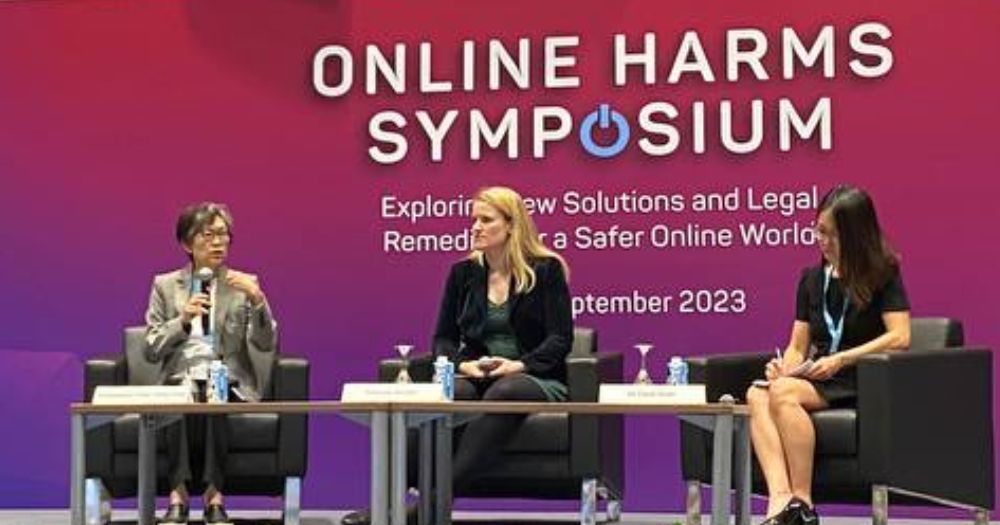"(The) normalisation of online harms is unhealthy," said Singapore Management University vice president Professor Lim Sun Sun.
"It should not be this way," she explained. "We should not allow our society to fall into the trap of assuming that online harm is a part and parcel of the online experience. I think once we've given in to that notion, we've given up completely."
Lim was speaking virtually from Seoul, Korea, at a panel discussion on global solutions for vital issues on the internet, social media, and online harm on Sep. 25 at the Online Harms Symposium.
Alongside her were:
- Ambassador-at-large Chan Heng Chee, Ministry of Foreign Affairs
- Carol Soon, principal research fellow at Institute of Policy Studies (IPS)
- Frances Haugen, Advocate for Accountability and Transparency in Social Media
Social media usage comparable to consuming mood-enhancing cereals: Lim
As a parent, Lim said that she carefully considered the kinds of food that she served her children. She also thoroughly read the food labels before buying them for her children.
However, she was not able to choose the online content for her children when they surfed the Internet.
Lim compared the usage of social media with an extended analogy of a fictitious mood-enhancing cereal. According to her, the risks of the mood enhancers are not mentioned on the cereal box. Hence, unknown to the parents, the cereal causes children to go through emotional rollercoasters two hours after eating it.
She explained that just as parents do not know the after-effects of such mood-enhancing food, they also do not have enough information to choose the right online content for their children.
She asked rhetorically which parents would feed their children with a product "so fraught with risk", and said this was comparable to the Internet.
Lack of informational agency and symmetry troubling: Lim
Informational asymmetry also applies to Internet and social media users, who do not have enough information as to the kinds of choices they can make online, Lim explained.
"We may have reached a point where we don't know what we don't know," said Lim, referring to the informational asymmetry between technology companies, policymakers and academia.
She said that this is concerning because policymakers do not know if social media has a positive or negative impact on children's development, and how online harms can affect an individual's personal safety.
And this is when Lim, who is also a member of Sunlight Alliance for Action (AfA), cited one key 2022 survey finding from her organisation to show that people suffered from negative psychological effects from online harms.
According to the survey, 33.5 per cent of the respondents felt sad, anxious, or depressed after experiencing online harm.
False information another major concern: Soon
Another type of online harm that is of concern is false information, misinformation, and disinformation.
For instance, Soon cited her 2021 IPS study which stated that 70 per cent of the respondents recognised false information on social networking sites and instant messaging apps, but chose to ignore it.
For enhanced online cyberspace regulations and governance, Chan suggested that the Singapore government could accommodate and work with technology companies.
Likewise, Frances Haugen stated that transparency is needed for companies, governments, and the public to work together to combat online harm.
Regional countries more similar than different: Soon
Haugen mentioned that Asean has released its Regional Plan of Action that aims to protect children from online exploitations and abuses, much like the European Union's Digital Services Act.
Meanwhile, Soon observed that regional countries around Singapore share more similarities than differences.
For example, Malaysia is looking at laws to allow its government to remove harmful materials that fall under the 3R categories - race, religion and royalty.
This is similar to Singapore's existing approach to take action against offensive content involving race and religion.
It is a criminal offence in Singapore under the Sedition Act and Section 298 of the Penal Code to incite or promote hostility between races and religions.
Elsewhere, Malaysia, Thailand, and Indonesia also have existing laws to address some types of online harm, Soon said.
Australia has launched eSafety Commissioner, a government agency dedicated to keeping people safe online.
The UK also passed its Online Safety Bill on Sep. 20 in parliament.
Meanwhile, Soon mentioned that countries like Malaysia, India, China, and the U.S. are considering amending their laws to protect children from online harm.
The Online Harm Symposium
The Online Harm Symposium takes place from Sep. 25 to 27 at the Singapore Management University Yong Pung How School of Law (YPHSL). It is organised jointly by the law school and the Ministry of Law.
It will cover issues on protecting and empowering online harm victims, as well as facilitate discussions on the appropriate legal remedies and laws that these victims can turn to.
You can view Day 1 of the symposium here:
Top image from Fiona Tan.
@mothershipsg Missed out on the news? Try 2 weeks in 2 minutes. #tiktoksg #floods #sgnews ♬ original sound - Mothership
Related stories

If you like what you read, follow us on Facebook, Instagram, Twitter and Telegram to get the latest updates.



